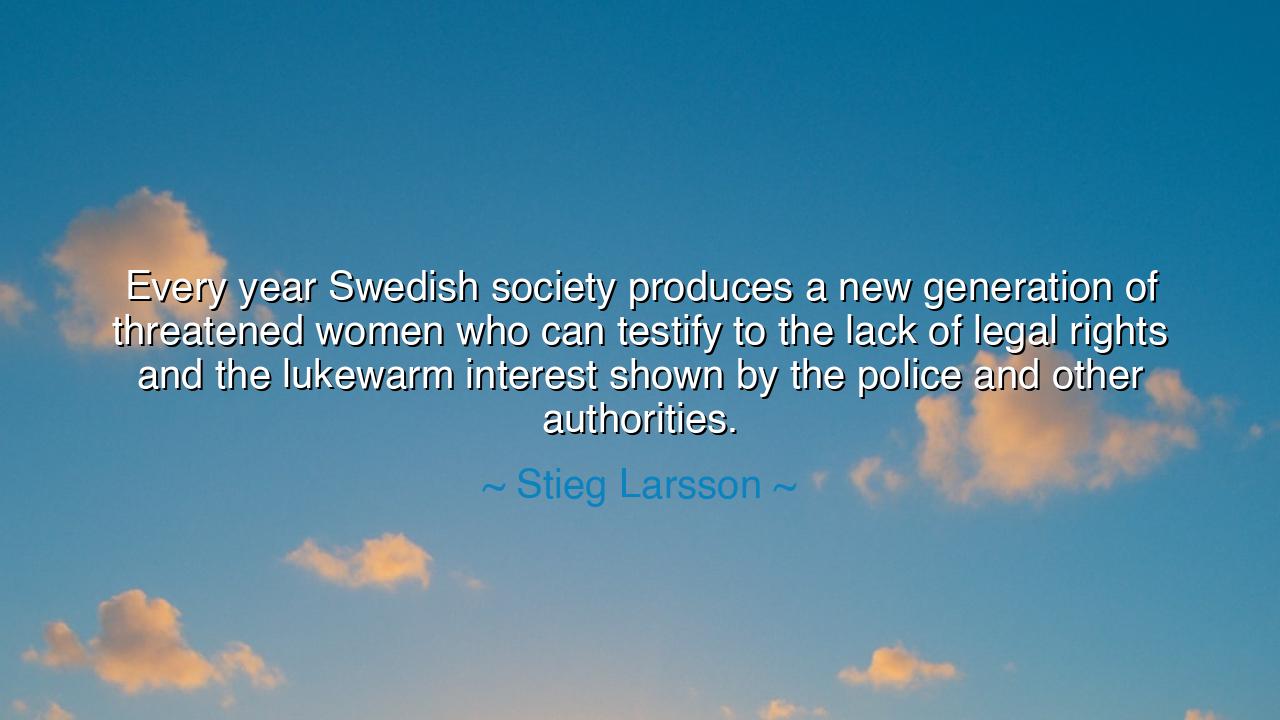
Every year Swedish society produces a new generation of
Every year Swedish society produces a new generation of threatened women who can testify to the lack of legal rights and the lukewarm interest shown by the police and other authorities.






In the dark mirror of civilization, where progress and apathy often walk hand in hand, Stieg Larsson — the chronicler of justice and corruption — uttered these haunting words: “Every year Swedish society produces a new generation of threatened women who can testify to the lack of legal rights and the lukewarm interest shown by the police and other authorities.” His words are not a mere lament for Sweden alone, but for all societies that pride themselves on enlightenment while leaving their daughters in shadow. Beneath his statement lies an eternal truth: that when a society turns its face away from the suffering of its women, it begins to rot from within, no matter how bright its outer glow.
The origin of this quote springs from Larsson’s own country — one celebrated for its equality, education, and order — and yet, he saw through its polished surface. As an investigative journalist and author of The Girl with the Dragon Tattoo, he uncovered the hypocrisy hidden behind civility: the silent epidemic of violence against women, tolerated by bureaucratic indifference and sustained by a culture that pretends all is well. He witnessed how the system — its laws, police, and institutions — too often treated the cries of women as inconveniences rather than calls for justice. His words, therefore, are an indictment not just of individuals, but of institutional coldness, of a nation that boasts of fairness while failing to protect the vulnerable.
Larsson’s warning echoes across history, resonating with the voices of countless women who have suffered in silence beneath the gaze of indifferent powers. Consider the story of Hypatia of Alexandria, the philosopher and mathematician of ancient Egypt, whose brilliance threatened the fragile egos of men in power. She was murdered, her body desecrated, and though centuries have passed, her fate stands as a symbol of how fear and misogyny can destroy the noble. The same spirit of injustice lives on in every age — in every courtroom that doubts a survivor’s testimony, in every authority that looks away rather than confront the truth. Larsson, like the prophets of old, wrote to tear away the veil of hypocrisy and remind us that progress without compassion is hollow.
When Larsson speaks of “a new generation of threatened women,” he names a terrible cycle — one that repeats itself because society refuses to break it. Each generation inherits not only the sins of the past, but the silence that allowed them. The laws may evolve, but the attitudes remain stagnant; the words of equality are spoken, but the deeds of protection lag behind. And so, women grow up knowing that justice may be promised but rarely delivered — that those meant to defend them will, too often, question their pain. It is not only the failure of law, but of spirit — a moral laziness that dulls empathy until compassion becomes mere formality.
The “lukewarm interest” Larsson condemns is perhaps the most insidious evil of all — for it wears the face of civility. It is the polite shrug, the bureaucrat’s sigh, the official’s empty words of concern. It is not the cruelty of monsters, but the indifference of good men who do nothing. History teaches us that injustice survives not because evil is strong, but because goodness sleeps. In every corner of the world, where women are dismissed, silenced, or blamed, this same lukewarmness thrives. And every time society chooses comfort over confrontation, another voice is lost to fear.
Yet Larsson’s words are not written in despair, but in defiance. He believed in the power of truth to shake the walls of apathy. His novels, especially his portrayal of Lisbeth Salander, gave voice to the voiceless — women who fight back, not with permission, but with courage. Through fiction, he revealed what law and government refused to face: that when the protectors fail, the oppressed must become their own defenders. His writing stands as both accusation and hope — a call to awaken, to confront the quiet violence that society hides beneath politeness and order.
The lesson for those who read his words is timeless: justice requires fire, not lukewarm hearts. One cannot mend what one refuses to see. If you wish to live in a world worthy of its women, you must demand laws that protect, institutions that listen, and cultures that believe. Speak for those who are silenced, and challenge systems that treat empathy as inconvenience. The fight for dignity is not a task for the weak, but for the brave — and it begins not with outrage, but with persistence.
And so, let Larsson’s words echo like a warning bell across generations: a society that tolerates indifference toward its women tolerates its own decay. Whether in Sweden or beyond, the measure of civilization is not in its wealth or its progress, but in how it shelters the threatened and honors the unheard. May we never become numb to their suffering. May we, instead, be the generation that ends the cycle — that replaces cold law with living justice, and replaces lukewarm interest with the fierce fire of compassion. For only then can we claim to be truly human.






AAdministratorAdministrator
Welcome, honored guests. Please leave a comment, we will respond soon